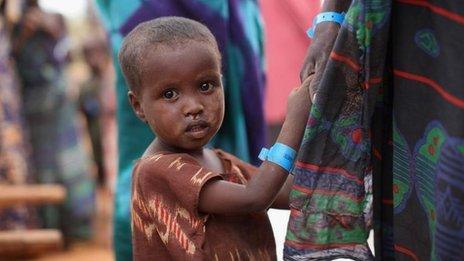How improving children's diets can aid development
- Published

Adequate nutrition is key to a child's development
Early malnutrition can blight a child's development - and also that of their community and nation, say Anthony Lake. director of Unicef and President Jakaya Kikwete of Tanzania.
In this week's Scrubbing Up column, they say a new initiative called Scaling Up Nutrition - backed by the G8 - is crucially important.
The foundation of a healthy future for every child is the 1,000 days between a mother's pregnancy and her child's second birthday.
The right nutrition during this critical period puts a child on track to be stronger, healthier and ready to learn.
Well-nourished children grow to be adults that can earn to their potential and contribute to the economic and social development of their families, communities and nations - building a strong foundation for a better world.
An estimated 180m children under the age of five years in the world are up to 4-6" (10-15cm) shorter than their peers. The reason is not genetics or disease, but a condition called stunting.
It is caused by chronic nutritional deficiencies during that 1,000 day window of opportunity.
Earnings boost
When we consider that a lack of adequate nutrition can cause a five-year-old to lose up to a half-foot of growth, it is no surprise that the effects also extend to the immune system and cognitive development, permanently limiting the child's capacities and opportunities throughout life.
The effects are costly: the World Bank estimates that countries blighted by stunting and other consequences of malnutrition lose at least 2-3% of their gross domestic product, as well as billions of dollars in forgone productivity and avoidable health care spending each year.
We have seen first-hand the debilitating and often deadly effects of malnutrition.
But we have also seen how communities and countries are strengthened by an investment in nutrition.
Prioritising nutrition in national development yields significant economic benefits - one study has found that improving nutrition during childhood can increase earnings in adult life by up to 46%.
So imagine what a child could do, what a nation could do, what we as a global community could do - if nourished to reach full growth and potential.
Recently, the Copenhagen Consensus, a group of leading economists, including four Nobel Laureates, found that fighting malnourishment should be the top priority for those seeking to improve global welfare.
Based on research, the Consensus recommends improving availability of vitamins and minerals, complementary foods and treatments for intestinal worms and diarrhoeal diseases, as well as education and information on good nutrition practices - which could reduce chronic malnutrition by 36% in developing countries.
Even in very poor countries and using conservative assumptions, each dollar spent to reduce chronic malnutrition can have at least a $30 (£19) payoff.
Taking action
That is why, as members of the Scaling Up Nutrition (SUN) Movement's Lead Group, we are committed to creating lasting change through improved nutrition, thereby lifting communities and nations out of the cycle of poverty and on to the path of productivity.
The SUN Movement, which brings together more than 100 global partners in the international community, business, civil society, researchers and donor governments, is a push for action toward better maternal and child nutrition.
Led by countries facing nutrition challenges, it aims to support a growing number of countries developing national plans and programs to tackle malnutrition, and to learn from and help each other in the process.
SUN is a different approach to improving nutrition.
We're working with new partners, coordinating across sectors and looking for innovative ways to create sustainable change that no one organisation, business or government could achieve alone.
Our work is supported by other efforts: investing in agricultural output has also been highlighted by the Copenhagen Consensus as a way to make children smarter, better educated and higher paid, helping to break the intergenerational cycle of poverty.
US President Barack Obama recently announced a new G8 initiative to invest in improving agriculture and food and nutrition security.
As part of that initiative, the G8 will actively support SUN and pledge to maintain robust programs to further reduce child stunting.
We know all too well the debilitating and deadly effects of malnutrition.
But now, through SUN, we are witnessing communities and countries taking action to scale up nutrition, allowing people to thrive in the good years and to weather the bad ones.
Both of us know that investing in nutrition isn't just the foundation for building a better world; it's also a powerhouse for development, driving improved health, productivity, educational achievement and economic performance.
Because good nutrition truly empowers children, families, communities and nations, it's a cost-effective opportunity for major, sustainable, global development progress. We know what to do.
Countries are ready to do it. Let's invest now.